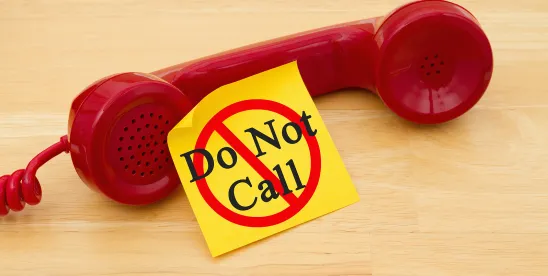TCPA revocation cases are on the rise, and a closely related type of case– the internal DNC claim– is on the rise along with it.
There is a slight difference between the two types of cases, and one which we don’t talk about much on TCPAWorld.com (and that no one else talks about really.)
In a revocation case, the Plaintiff is either on the national DNC list or received calls using regulated technology (ATDS/prerecorded voice/artificial voice). In that setting when a Plaintiff says “stop” the calls must stop during a “reasonable time” not to exceed 10 business days.
But what if the Plaintiff is receiving telemarketing calls that AREN’T made using regulated technology and the Plaintiff’s number ISN’T on the DNC list? (Also, aren’t is a weird word isn’t it? Aren’t. Just don’t see it in print very much.)
Consumers actually DO NOT have the right to sue directly for unwanted telemarketing calls if they are not on the DNC list. Let me say that again– the TCPA does NOT give consumers the right to sue directly for marketing calls after they say “Stop” if they are not on the DNC and are not called using regulated technology.
However, the DNC rules require ALL telemarketers to have a policy in place to prevent calls to consumers after revocation. And most courts hold a consumer CAN sue a marketer for a lack of such a policy.
So IF a consumer is called after asking for calls to stop they can sue the marketer but ONLY for lacking a policy– not for the phone call itself.
Following along so far?
Great.
So that begs the question– when does a court have to accept a plaintiff’s allegations that a marketer lacks a policy?
That can be a very important question because it determines whether a case makes it past the pleadings stage and into expensive discovery proceedings.
Well in Hulett v. Eyebuydirect, 2025 WL 1677071 (N.D.N.Y. June 13, 2025) the Court determined not every case in which a Plaintiff alleges calls continued after a “stop” notification warrants an internal DNC claim to proceed past the pleadings stage. Instead, in the court’s view a Plaintiff must show something unreasonable took place– and in that case, it had not.
In Hulett the Plaintiff received “at least one” text message from Defendant and responded “stop.” Plaintiff was told: “You’ve opted out and will no longer receive messages from Eyebuydirect.” Great.
Except he received three more messages. Eesh.
The messages were sent over nine days (seven business days.)
Now at the time the messages were sent the CFR requires businesses to have a policy of stopping texts and calls within a reasonable time not to exceed 30 days. Under the new rules a business has 10 business days to stop calls– so Eyebuydirect’s practices would have been fine.
But the Plaintiff alleged Eyebuydirect used an automated system and that calls could have stopped immediately. He claims the failure to stop the messages right away showed EBD lacked a policy.
The Court disagreed. Determining the rather limited number of texts sent over a relatively short period of time was not consistent with a complete lack of policy the Court dismissed the case. In doing so the court was sure to note that not every such case should be tossed, but those where a defendant acted reasonably do not give rise to a claim:
To be clear, the Court’s decision should not be read to universally foreclose future actions under § 64.1200(d) which rely in part on allegations pled on information and belief. Such a broadly applicable rule would violate the Court’s obligation to draw reasonable inferences in favor of plaintiffs, especially considering the lack of information available to Plaintiff discussed herein. Instead, courts must consider the facts which are concretely alleged, alongside those pled on information and belief, and assess whether the allegations as a whole plausibly suggest liability under § 64.1200(d)(3).
So there you go.
Take aways here:
- All marketers MUST have an internal DNC policy that requires messages and calls to stop within a reasonable time of having been notified (currently 10 business days);
- Allegations of a limited number of texts sent during a limited number of days following a revocation may not be sufficient to state a claim; and
- Remember, this is an entirely separate provision from DNC and regulated technology claims that are independently actionable.




 />i
/>i
